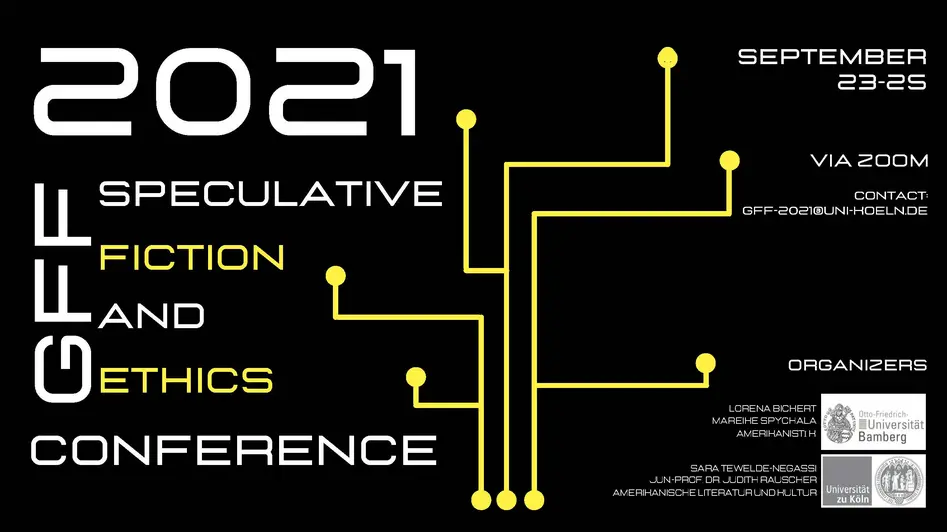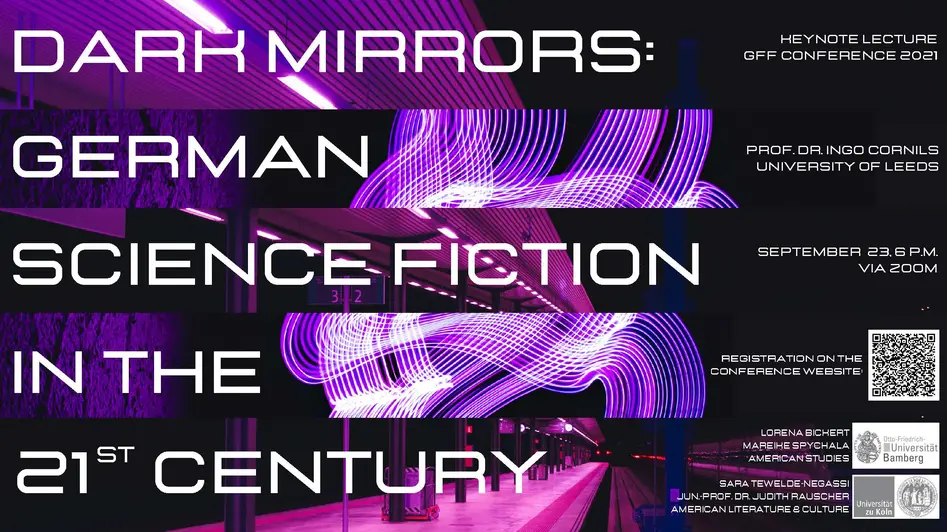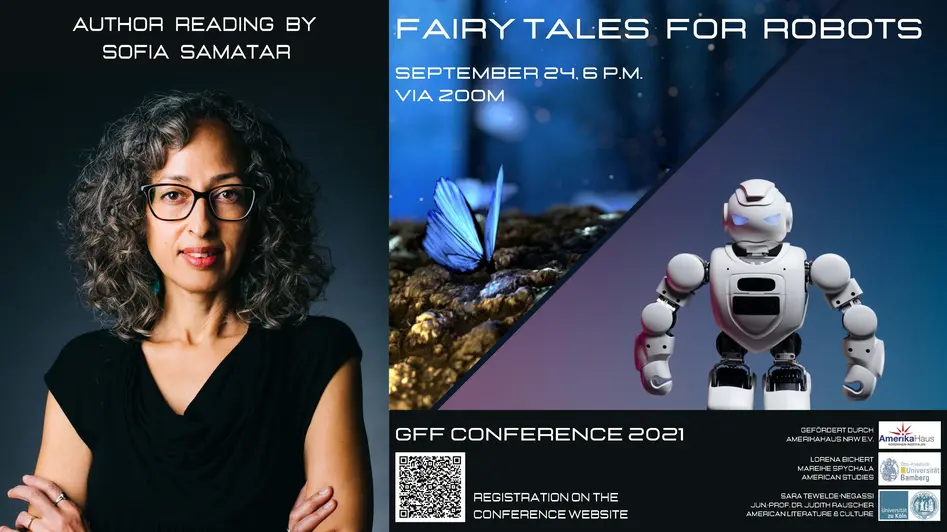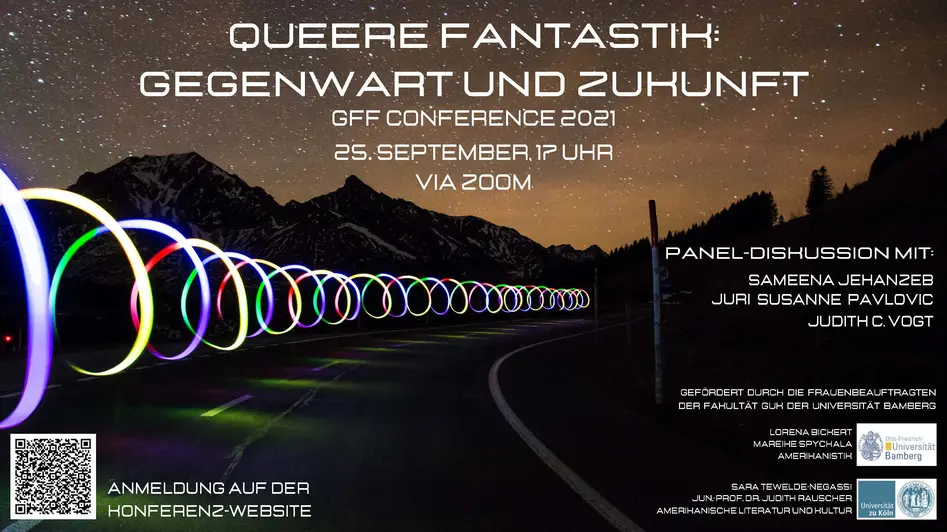"Spekulative Fiktion und Ethik" - 12. Jahrestagung der Gesellschaft für Fantastikforschung
Universität Bamberg / Universität zu Köln (Virtuell) 23.-25. September 2021
Die 12. Jahrestagung der Gesellschaft für Fantastikforschung e.V. (GFF) wird gemeinsam von Wissenschaftlerinnen der Universität zu Köln und der Otto-Friedrich-Universität Bamberg organisiert:
- JProf. Dr. Judith Rauscher (Köln)
- Mareike Spychala (Bamberg)
- Sara Twelede Negassi (Köln)
- Lorena Bickert (Bamberg)
Vorläufiges Konferenzprogramm
DAY 1: SEP 23, 2021 (Donnerstag/Thursday) | ||
|---|---|---|
| 9:00-09:30 | Begrüßung/ Welcome | |
| 09:30-11:00 | Panel I: Menschlichkeit und Verantwortung (Dt.) | Panel II: Gender and Race in Speculative Fiction (Engl.) |
| 11:00-11:30 | Coffee Break/ Kaffeepause | |
| 11.30-12:30 | Panel III: Kantian Speculations (Engl.) | Panel IV: Kontrafaktik in der Fantastik (Dt.) |
| 12:30-13:30 | Mittagspause/ Lunch Break | |
| 13:30-15:00 | Panel V: Verantwortung und Nicht-Menschlichkeit (Dt.) | Panel VI: Queer Speculations I - Corporeality (Engl.) |
| 15:00-15:30 | Coffee Break/ Kaffeepause | |
| 15:30-17:00 | Panel VII: Imagining Corporeal Ethics and Social Justice (Engl.) | Panel VIII: Political Possibilities (Engl.) |
| 17:00-18:00 | Spazierpause/ Walking Break | |
| 18:00-19:00 | Keynote by Prof. Dr. Ingo Cornils: "Dark Mirrors: German Science Fiction in the 21 Century" | |
DAY 2: SEP 24, 2021 (Freitag/Friday) | ||
|---|---|---|
| 10:00-10:30 | Begrüßung/ Welcome | |
| 10:30-12:00 | Panel IX: Fantastische Geschichte(n) (Dt.) | Panel X: Beyond Good and Evil in the Fantastic (Engl.) |
| 12:00-13:30 | Mittagspause/ Lunch Break | |
| 13:30-15:00 | Panel XI: Speculative Environments (Engl.) | Panel XII: Fantastik in Romanischen Literatur (Dt.) |
| 15:00-15:30 | Kaffeepause/ Coffee Break | |
| 15:30-17:00 | Panel XV:Queer Speculations II - Transgressions (Engl.) | Panel XVI:Imagining Otherness in Speculative Fiction (Engl.) |
| 17:00-18:00 | Spazierpause/ Walking Break | |
| 18:00-19:00 | Author Reading by Sofia Samatar: “Fairy Tales for Robots” (Engl.) | |
DAY 3: SEP 25, 2021 (Samstag/Saturday) | ||
|---|---|---|
| 09:00-09:30 | Begrüßung/ Welcome | |
| 09:30-11:00 | Panel XV: Brave New Worlds (Engl.) | Panel XVI: Fantastic Temporalities (Engl.) |
| 11:00-11:30 | Kaffeepause/ Coffee Break | |
| 11.30-13:00 | Panel XVII:Ethik und Außerirdisches Leben (Dt.) | Panel XVIII:Posthumanism and Afropessimisim in Black SF (Engl.) |
| 13:00-14:00 | Mittagspause/ Lunch Break | |
| 14:00-16:00 | GfF Mitgliederversammlung/ GfF General Meeting | |
| 16:00-17:00 | Spazierpause/ Walking Break | |
| 17:00-18:30 | Panel Diskussion: Queere Fantastik (Dt.) | |
| 18:30-19:00 | Verabschiedung/ Wrap Up | |
Special Events
Keynote Vortrag von Prof. Dr. Ingo Cornils: "Dark Mirrors: German Science Fiction in the 21 Century" (Donnerstag, 23. September, 18 Uhr, Zoom)
Abstract: German SF in the 21st century tends to see the dystopian form as the ideal vehicle to explore the social and psychological consequences of scientific and technological progress. There is no point in denying that the ‘dystopian turn’ reflects the mood of our time, and that the first two decades of the new millennium have given rise to fears and misgivings about increasingly porous boundaries, conceptual paradigm shifts, and persistent global challenges that make our scientific and technological advances feel hollow. At the same time, one may wonder whether the endless depiction of depressing futures in recent SF may not in fact yield diminishing returns in terms of the intended warning function and instead convince its audiences to give up hope altogether. In my keynote lecture I will look at recent German SF novels (Thomas von Steinaecker’s Die Verteidigung des Paradieses and Sibylle Berg’s GRM: Brainfuck), to analyze how they establish their dystopian worldview. But I will also be looking at the green shoots of positive visions (Tom Hillenbrand’s Qube, Andreas Brandhorst’s Die Eskalation, Judith and Christian Vogt’s Wasteland, and Andreas Eschbach’s Eines Menschen Flügel). These give us glimpses of “concrete utopias” even as they contemplate the destructive impact of human activity on our planet. I argue that these latter works demonstrate a radical rethinking of the purpose of writing SF in the 21st century, offering a “progressive fantastic”, and a new hope.
Prof. Dr. Ingo Cornils is professor of German Literature and Culture of the 20th/21st Century at the University of Leeds (UK). In his research, he focuses on utopian thought Science Fiction, th German Student Movement ('1968'), German Romanticism, German Current Affairs, and "Zukunftsbewältigung." Prof. Cornils is a long-standing member of the Gesellschaft für Fantastikforschung (GfF) and the author of Beyond Tomorrow: German Science Fiction and Utopian Thought in the 20th and 21st Century (2020). Find more information on his work on his personal website.
Lesung von und mit Sofia Samatar: "Fairy Tales for Robots" (Freitag, 24. September, 18 Uhr, Zoom)
This event is organized with the support of Amerikahaus NRW e.V.
Sofia Samatar is the author of the novels A Stranger in Olondria and The Winged Histories, the short story collection, Tender, and Monster Portraits, a collaboration with her brother, the artist Del Samatar. Her work has won several awards, including the World Fantasy Award. She is a long-standing member of the International Association for the Fantastic in the Arts (IAFA) and she teaches African literature, Arabic literature, and speculative fiction at James Madison University. During this event, she will read from her story "Fairy Tales for Robots" and discuss questions of ethics in Fantasy and Science Fiction, focusing on the way old stories can illuminate current concerns. What do the magical beings and animated dolls of fairy tales share with robots? How might fairytale depictions of nonhumans comment on artificial intelligence? Where do the oldest stories gesture toward issues that haunt technological societies, such as racialized and gender-based violence, economic injustice, and environmental degradation? And what explains the powerful attraction in tales of the non-quite-human, both in the past and today?
Panel-Diskussion: "Queere Fantastik: Gegenwart und Zukunft" (Samstag, 17 Uhr, Zoom)
Die Panel-Diskussion wird von den Frauenbeauftragten der Fakultät GuK gefördert.
In dieser Panel-Diskussion kommen aktuelle Autor*innen der deutschen Science Fiction und Fantasy-Literatur zur Geschichte, momentanen Situation, und aktuellen Entwicklungen in der queeren deutschen Science Fiction und Fantasy Literatur zu Wort. An der Diskussionsrunde nehmen teil:
- Sameena Jehanzeb (Science Fiction und Fantasy Autorin, Illustratorin, Designerin)
- Juri Susanne Pavlovic (Fantasy Autori*n, Textehexe*r und Lektor*in)
- Judith C. Vogt (Science Fiction und Fantasy Autorin, Rollenspielentwicklerin, Mit-Herausgeberin vonQueer*Welten)



